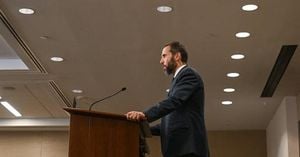NASA has ratified its collaboration with SpaceX to facilitate the return of astronauts Suni Williams and Butch Wilmore from the International Space Station (ISS), affirming their commitment to execute the plan 'as soon as practical.' This confirmation came shortly after former President Donald Trump urged SpaceX and Elon Musk to expedite the astronauts' return, expressing concerns over their prolonged stay aboard the ISS.
Trump's remarks, made on social media, came as the astronauts had been scheduled to return to Earth aboard a SpaceX capsule later this March. They have been onboard the ISS for several months longer than anticipated due to continuing complications with Boeing's Starliner spacecraft. Initially, Williams and Wilmore were part of the crew of Starliner during its maiden crewed flight, which was expected to last just one week. Instead, the astronauts have been stationed on the ISS, conducting research and studies, for nearly eight months.
Details from the Trump administration suggest there was pressing desire for their return, with the former president stating, 'I have just asked Elon Musk... to ‘go get’ the 2 brave astronauts who have been virtually abandoned in space by the Biden Administration.' NASA, clarifying the situation, emphasized the astronauts' well-being, stating they are healthy and actively involved with scientific activities aboard the station.
Both astronauts have assured the public about their current situation. They participated in an exclusive interview where they discussed their daily routines and expressed their focus on completing important experiments instead of lamenting their extended time above Earth. Suni Williams noted, 'We try to focus on the now, what’s taking place here; the important work that's going on,' reflecting their commitment to their mission.
The return of Williams and Wilmore has been complicated by persisting issues with Boeing's Starliner vehicle, which has faced multiple setbacks, making its return capabilities dubious. NASA's decision to utilize SpaceX for the astronauts' return stems from the necessity for reliable transportation, pushing the agency to select the Crew Dragon spacecraft for the mission.
NASA had previously set the expectation for the astronauts' return for late March. The confirmed schedule is dependent on the launch of Crew-10, which will send additional astronauts to the ISS. Any alteration to this timeline could potentially raise concerns about the personnel balance aboard the ISS, which is carefully managed. An earlier return for Williams and Wilmore might leave the ISS short-staffed with only one American astronaut remaining aboard.
Meanwhile, the astronauts have also ensured the public of their comfort and their continued engagement with scientific experiments and procedures, utilizing the unique tools and environment of the ISS for various research projects. Their prolonged stay has allowed them to gather significant data and experience, enabling future deep-space missions, including potential lunar explorations under NASA's Artemis program and even ambitions for Mars missions facilitated by SpaceX’s Starship.
Despite the mixed messages from political leadership, NASA's position remains firm. A spokesperson confirmed, 'NASA and SpaceX are expeditiously working to safely return the agency’s SpaceX Crew-9 astronauts Suni Williams and Butch Wilmore.' They highlighted their readiness to proceed with the return plan, dismissing concerns over previous discussions instigated by external pressures.
Across the globe, both astronauts emphasized the importance of maintaining focus on their activities aboard the station, minimizing distractions from back on Earth. Williams stated, 'We just need to learn how to adapt,' appealing to the remarkable challenges astronauts tackle daily even as they navigate unknowns.
With the visibility of space missions growing and international cooperation on the rise, the astronauts' narrative presents not just challenges of logistics but also highlights the themes of resilience and scientific advancement which are pivotal to the future of space exploration. Their insights from the ISS work not only aim to serve present-day avatars working on the frontier but strive as foundational stones for adventures beyond.
While the political ramifications of delayed astronaut returns attract attention, the astronauts themselves echo sentiments of purpose and dedication to their roles. Williams remarked, 'It's fun to just trade stories and talk about culture and food' with their international colleagues aboard the ISS, emphasizing the underlying human connections formed beyond Earthly concerns.



